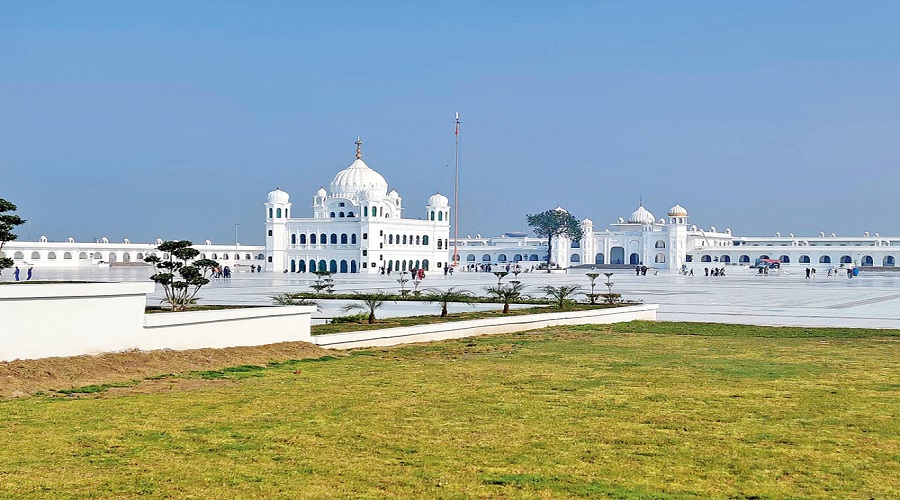Kartarpur Sahib, or Gurdwara Darbar Sahib Kartarpur, is the soul of Sikhism, going beyond its physical presence. Situated along the banks of the Ravi River in the Narowal district of Pakistan, this sacred site is a witness to the timeless teachings and legacy of Guru Nanak Dev Ji, the founder of Sikhism.

History
The history of Kartarpur Sahib is an integral part of Sikhism. Guru Nanak Dev Ji, after his extensive travels and spiritual journeys, chose this peaceful place to establish Kartarpur as a center of spirituality and enlightenment.
Here, Guru Nanak Dev Ji spent the last 18 years of his life, continuing his divine mission of spreading the message of peace, love and equality among all mankind.
During this pivotal period in Sikh history, Guru Nanak's teachings took root and flourished in the peaceful embrace of Kartarpur. The principles that Guru Nanak focused and stressed on the oneness of God, the equality of all men, and selfless service.
Foundation of Sikhism
Kartarpur Sahib played a central role in the formation of the Sikh community. Guru Nanak's teachings laid the foundation of Sikhism, emphasizing the unique nature of God and the equality of all human beings.
But what set Kartarpur apart was the following of these principles.
Guru Nanak founded the Langar Institution, a community kitchen that provided free meals to all,neglecting the social or economic differences. This tradition of equality and inclusion remains a hallmark of Sikhism to this day.
Place of Wisdom
Kartarpur Sahib emerged as the center of the beginning of Sikhism. This place preserves many hymns of Guru Nanak Dev Ji known as Shabads or Bani within its sacred walls.
The profound verses written by him during his stay at Kartarpur found a permanent place in the Guru Granth Sahib, the central religious scripture of Sikhism.
They continue to be a source of spiritual guidance and inspiration to Sikhs worldwide .
Symbol of InterFaith Harmony
Apart from its spiritual significance, Kartarpur Sahib radiates cultural and interfaith harmony.
It not only influenced Sikh art, music and literature but also represents interfaith harmony. Kartarpur welcomes followers of different faiths,reflectingGuru Nanak's message of universal brotherhood. Kartarpur Sahib's teachings go beyond religious boundaries and promote values that promote peaceful coexistence.
Guardian of Sikh Heritage
Apart from its spiritual and cultural importance, Kartarpur Sahib is the custodian of Sikh heritage.The Gurdwara complex is an architectural marvel.
The Darbar Sahib, the main prayer hall, features intricate art and marble,reflecting the deep respect that Sikhs have for their faith and its founders.
The langar hall where communal meals are served is an evidence to humility and selfless service and values that Guru Nanak preached and which are central to Sikhism even today.
A Pilgrimage to the Soul
For Sikhs, visiting Kartarpur Sahib is not just a physical journey; it is a pilgrimage of the soul.
Pilgrims from all over the world embark on this holy journey to rediscover their spiritual roots, immerse themselves in the teachings of Guru Nanak Dev Ji and absorb the deep spiritual atmosphere that surrounds this sacred land.
Kartarpur Sahib offers comfort & peace, offering rest to restless minds and hearts seeking fulfillment.
A Timeless Bridge
This holy place transcends historical and geographical boundaries. It acts as a bridge connecting the past with the present, connecting Sikhs and seekers of truth with the timeless wisdom and spirituality that has flowed from this place for centuries. It remains a timeless source of inspiration for millions.
Conclusion
Kartarpur Sahib, the "City of God", is not only a physical destination but also a deep spiritual journey that brings us closer together to shared humanity and the enduring truths preached by Guru Nanak Dev Ji.
Kartarpur Sahib invites us to embrace the values of love, equality and service that illuminated its path .
Note- We have made every effort to ensure the accuracy and reliability of the information provided. However, this content is intended for informational purposes only and reflects historical and cultural perspectives. DVN does not assume responsibility for any disputes or actions that may arise from the use of this content. If you believe any information is incorrect or misleading, please contact us.